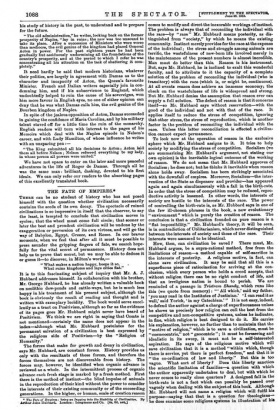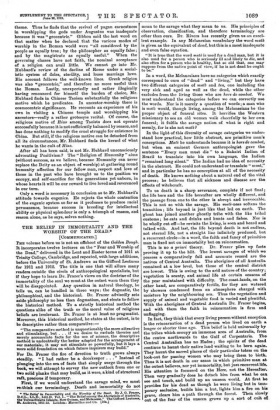THE FATE OF EMPIRES.*
THERE can be no student of history who has not posed himself with the question whether civilization necessarily contains the seeds of its own decay. The spectacle of ruined civilizations is so impressive in itself that the observer, to say the least, is tempted to conclude that civilization moves in cycles ; that the wheel must come full circle; that sooner or later the best and proudest civilization will be undone by the exaggeration or perversion of its own virtues, and will go the way of Babylon, Egypt, Greece, and Rome. In our braver moments, when we feel that after all it must be possible to press asunder the gripping fingers of fate, we search hope- fully for the vital secret of permanence. History does not help us to prove that secret, but we may be able to deduce it or guess it—to discover, in Milton's words,— "What makes a nation happy, keeps it so,
What ruins kingdoms and lays cities fiat."
It is to this fascinating subject of inquiry that Mr. A. J. Hubbard addresses himself. In collaboration with his brother, Mr. George Hubbard, he has already written a valuable book on neolithic dew-ponds and cattle-ways, but he is much less happy in his treatment of his present subject, although the book is obviously the result of reading and thought and is written with exemplary lucidity. The book would serve excel- lently as a tract on Positivism, although so far as the evidence of its pages goes Mr. Hubbard might never have heard of Positivism. We think we are right in saying that Comte is not mentioned—certainly the name does not appear in the index—although what Mr. Hubbard postulates for the permanent salvation of a civilization is best expressed by the religious side of Positivism—by the "Religion of Humanity."
The forces that make for growth and decay in civilization, says Mr. Hubbard, are constant forces. History provides us only with the resultants of these forces, and therefore the forces themselves are not discoverable from history. The forces may, however, be identified when organic advance is reviewed as a whole. In the intermittent process of organic advance each fresh stage is marked by a fresh method. First there is the method of instinct—the blind impulse of animals in the reproduction of their kind without the power to consider the interests of their existing community or of the succeeding generations. In the higher, or human, scale of creation reason
• The Fate of Empires: being an Inquiry into the Stability of Civilization. By
Arthur John Hubbard. London : Longman and Co. [6e. 6d. net.]
comes to modify and direct the inexorable workings of instinct. The problem is always that of reconciling the individual with the race—by "race" Mr. Hubbard means posterity, as dis- tinguished from " society," by which he means the existing community. Instinct merely provides for the race at the expense of the individual ; the stress and struggle among animals are terrific, the wastefulness of new-born life involved merely in the maintenance of the present numbers is almost incredible.
Man must do better than this. Reason is his instrument. But, says Mr. Hubbard, he is inclined to exalt this wonderful faculty, and to attribute to it the capacity of a complete solution of the problem of reconciling the individual (who is transitory) with the race (which is, or might be, continuous). At all events reason does achieve an immense economy; the check on the wastefulness of life is widespread and strong. But Mr. Hubbard denies the assumption that reason ever can supply a full solution. The defect of reason is that it concerns itself—so Mr. Hubbard says without reservation—with the good of the individual and not with that of the race. It applies itself to reduce the stress of competition, ignoring that other stress, the stress of reproduction, which is another factor in the problem of reconciling the individual with the race. Unless this latter reconciliation is effected a civiliza- tion cannot expect permanence.
To look now at the operation of reason in the exclusive sphere which Mr. Hubbard assigns to it. It tries to help society by modifying the stress of competition. Socialism (we are summarizing Mr. Hubbard's argument, not stating our own opinion) is the inevitable logical outcome of the working of reason. We do not mean that Mr. Hubbard approves of Socialism; he does not; but he thinks it inevitable when reason alone holds sway. Socialism has been strikingly associated with the downfall of empires. Moreover, Socialism—the inter- vention of the State as dispenser and provider—has appeared again and again simultaneously with a fall in the birth-rate. In order that the stress of competition may be reduced, repro- ductive activity is lessened. In other words, the interests of society are hostile to the interests of the race. The power of controlling the birth-rate is, as Mr. Hubbard says in one of the few ill-chosen phrases in the book, a new evolutionary " environment " which is purely the creation of reason. The conclusion is that a civilization founded on pure reason is a "flat impossibility." Mr. Hubbard's theory, it will be seen, is in contradiction of Utilitarianism, which never distinguished between the interests of society and those of the race. Their interests were assumed to be identical.
How, then, can civilization be saved ? There must, Mr. Hubbard argues, be a supra-rational method, free from the limitations of reason—a method capable of self-sacrifice in the interests of posterity. A religious motive, in fact, can alone save civilization. It may be said that all this is a superfluous piece of ratiocination for arriving at the con- clusion, which every person who holds a creed accepts, that without religion there can be no right conduct of life, and that an irreligious nation is bound to perish. We are reminded of a passage in Tristram Shandy, which runs like this (we quote from memory) : "' All which,' said my father, you may read in the Institutes of Justinian." I can read it as well,' said Yorick, ' in my Catechism.' " It is not easy, indeed, to defend the author against a charge of superfluousness unless he shows us precisely how religion can cull the best from the competitive and non-competitive systems, unless he indicates, in fine, which religion is best designed to do it. He carries his explanation, however, no further than to maintain that the " motive of religion," which is to save a civilization, must be " cosmocentric," not " geocentric " ; it must be foreseeing and idealistic in its sweep, it must not be a self-interested aspiration. He says of the religious motive which will save civilization that it is a method "within which, though there is service, yet there is perfect freedom," and that it is " the co-ordination of law and liberty." But this is too vague. What sort of liberty ? Does this liberty sanction the scientific limitation of families—a question with which the author apparently undertakes to deal, but with which he never comes to really close quarters P A designed fall in the birth-rate is not a fact which can possibly be passed over vaguely when dealing with the subject of this book. Although Mr. Hubbard will not name a religion which will fulfil his purpose—saying that that is a question for theologians-- he does examine some religious systems in illustration of his theme. Thus he finds that the revival of pagan earnestness in worshipping the gods under Augustus was inadequate because it was " geocentric." Gibbon said the last word on that matter when be declared that the various modes of worship in the Roman world were "all considered by the people as equally true ; by the philosopher as equally false; and by the magistrate as equally useful." When the governing classes have not faith, the nominal acceptance of a religion can avail little. We cannot go into Mr. Hubbard's review of the decline of Rome under a social- istic system of doles, sterility, and loose marriage laws. His account follows the well-known lines. Greek religion was also Kgeocentric," and therefore no more useful than the Roman. Lastly, unexpectedly and rather illogically having renounced for himself the burden of choice, Mr. Hubbard finds in Chinese Taoism substantially the religious motive which be predicates. In ancestor-worship there is cosmocentric significance. He recounts an experience of his own in visiting a Chinese temple and worshipping his ancestors—really a rather grotesque recital. Of course, the religions motive of Rico among Taoists does not operate successfully because it is not sufficiently balanced by reason, and has done nothing to modify the cruel struggle for existence in China. But still, if the religious motive can be detached from all its circumstances, Mr. Hubbard finds the kernel of what he wants in the cult of Hiao.
After all has been said, is not Mr. Hubbard unconsciously advocating Positivism P The " Religion of Humanity" aims (without success, as we believe, because Humanity can never replace the Deity as an object of worship) at gathering round humanity affection for our fellow man, respect and love of those in the past who have brought us to the position we occupy, and self-sacrifice for the generations yet unborn, in whose hearts it will be our reward to live loved and reverenced in our turn.
Only a word is necessary in conclusion as to Mr. Hubbard's attitude towards eugenics. He rejects the whole contention of the eugenic system so far as it professes to produce racial permanence, because success in breeding for intellectual ability or physical splendour is only a triumph of reason, and reason alone, as he says, solves nothing.



























































 Previous page
Previous page